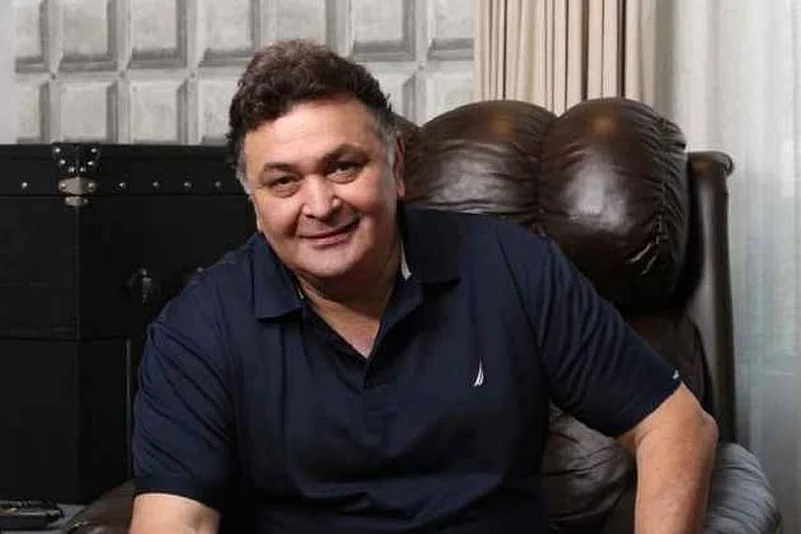Rishi Kapoor (1952-2020), the incurable romantic of the 1970s who prevented love stories from going out of vogue in the era of action multi-starrers in Bollywood, may not have got his due in his heyday but he fought his way back with remarkable resilience later in his career to showcase his real potential as an actor.
Son of venerable Raj Kapoor, Rishi shot to fame with his illustrious father’s trend-setting love story, Bobby (1973) and was subsequently flooded with similar roles in a plethora of romantic musicals. It was to his credit that he managed to make an impact quite early in his career despite getting trapped in a particular image. He was barely 21 when Bobby catapulted him into limelight but he faced a big stumbling block ahead with the sudden burst of action-oriented movies. And he also had to come out of the shadows of his “showman” father by proving that Bobby’s success was not a flash in the pan.
Advertisement
Bollywood was at the time had grown weary of the good, old boy-meets-girl stories and the audiences had started showing a remarkable predilection for maar-dhaad se bharpoor (action) cinema. Barely a few months before the release of Bobby, a superstar named Amitabh Bachchan had already arrived on the scene with the mega-success of Prakash Mehra’s Zanjeer (1973), establishing himself as the angry young man of Hindi cinema. The phenomenal rise of Big B, who went on become the numero uno star with movies such Deewar (1975), Sholay (1975) and many other action movies, signalled the downfall of the biggest romantic hero of time, Rajesh Khanna. It was an era completely dominated by Bachchan, which seemed to offer limited space to actors like Rishi.
Advertisement
And yet, he held his own despite all odds, delivering big solo hits such Khel Khel Mein (1975), which were not action movies. He also made his presence felt in a slew of multi-starrers such as Kabhi Kabhie (1976), Amar Akbar Anthony (1977) and Naseeb (1981), despite facing formidable co-stars such as Bachchan.
However, with acting running in his genes, the scion of the famous Kapoor clan did prove his histrionics wherever he got opportunities. After showing glimpses of his acting prowess as a teenager in his father’s Mera Naam Joker (1970), he proved his versatility time and again in movies like Laila Majnu (1976), Sargam (1979), Prem Rog (1982), Saagar (1985) and Tawaif (1985), Ek Chadar Maili Si (1986), to name a few but he could never shrug off the image of a romantic hero, once and for all, a bitter realisation that kept rankling him for years. Even after the ascendancy of stars like Aamir Khan, Salman Khan and Shah Rukh Khan in 1990s, he kept on playing “chocolaty” hero in romantic musicals such as Deewana (1992) and Bol Radha Bol (1991) opposite girls half his age. In between, even though he did try to break free from his image trap with films like Khoj (1989), he remained the quintessential lover boy of the industry.
Disillusioned with the kind of roles he was being offered, he turned to direction in a bid to revive his father’s famous R.K. Films banner with a Rajesh Khanna-starrer, Aa Ab Laut Chalen (1999), but its failure left him shattered. For several years, he retreated into background, letting his talented son Ranbir to hold the centre-stage and carry forward the family legacy. His detractors thought that his best was behind him at the turn of the new millennium, but he took everybody by surprise by staging an awesome comeback, this time in the pivotal roles of an elderly protagonist.
With the rise of content-driven cinema, he began to get and relish a variety of roles, ranging from a mean underworld don to a gay school principal, something he had yearned for all through in the previous innings of his career. With films like Kapoor & Sons (2016) and Mulk (2018), he emerged as the only actor of his generation, with the exception of Bachchan, who still had the producers queuing up to sign him on the dotted line. In fact, he surprised the critics by stealing the thunder from Bachchan in 102 Not Out (2018). He was truly having a whale of time and was busier than even his son in the past ten years.
Advertisement
He was also looking forward to many more challenging assignments when the tragedy struck. A battle with cancer in 2018 took him to the US from where he came back after a year, brimming with confidence to resume his career. He had even signed a big movie on return, an Indian adaptation of Hollywood hit, The Intern (2015) with Deepika Padukone before he was felled by the Big C.
Beyond his life as an actor, Rishi was also a remarkably candid and witty man, who never fought shy of calling a spade a spade both in and outside the film industry. In his twilight years of life, he found Twitter to be a great forum to underline both these qualities. Even though he rubbed many people the wrong way with his off-the-cuff remarks, none of it ever reeked of any malice towards anyone.
Advertisement
In his untimely death, Bollywood has lost another natural actor -- only a day after Irrfan Khan went away -- who will continue to light up the faces of the audience of many generations to come with a great repertoire he has left behind.
It is a fitting tribute to him that history will remember him not merely as a romantic hero but as an actor of substance with an astounding range.




















